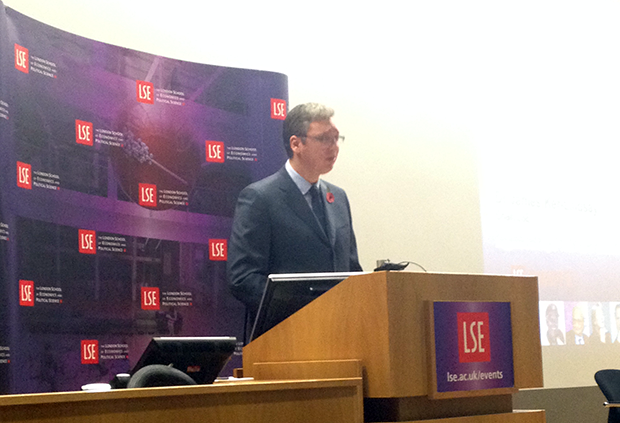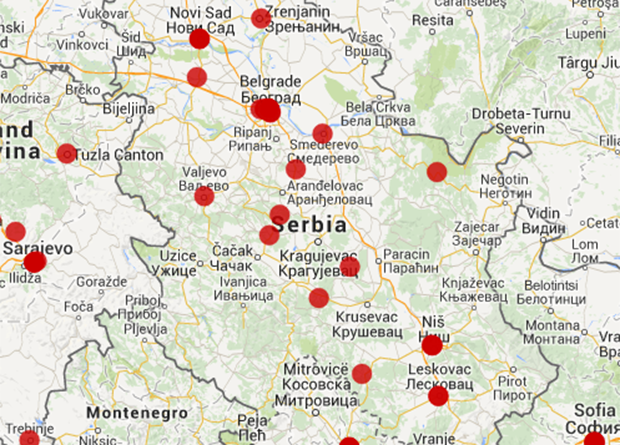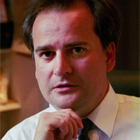Serbian prime minister grilled on press freedom at London event

Serbian Prime Minister Aleksandar Vucic speaking at LSE (Photo: Milana Knezevic)
It wasn’t quite a remote controlled drone carrying a provocative political message, but Serbian Prime Minister Aleksandar Vucic’s Monday night lecture at the London School of Economics (LSE) came with its own controversial incident.
“What can you say about the total censorship of all opposition media”, Vucic was asked by a young woman in the audience just as the premier sat down for the question and answer portion of the event. She explained that she was representing Nikola Sandulovic, an opposition politician from the Serbian Republican Party, who was sitting beside her. Sandulovic said later he had travelled to London to confront Vucic.
Chaos ensued. Sandulovic claimed, among other things, that a police officer connected to Vucic had threatened to kill him and that he had evidence contained on a CD he held aloft. Vucic hit back that the Republican Party had only 0.01% of public support, and disputed Sandulovic’s assertion that he had been an adviser to former Serbian Prime Minister Zoran Djindjic, who was assassinated in 2003. Accusations flew across the room until LSE’s moderator James Ker-Lindsay finally managed regain control of the situation.
After the event, Sandulovic told Index he came to London because the media in Serbia ignore him and his party, apart from when government-friendly outlets attack him.
That press freedom was a popular topic on the night did not comes as a surprise. Serbia has seen a string of censorship incidents during Vucic’s time in power, as Index and many others have reported.
The prime minister himself brought up the press in his introductory lecture. He explained how his government has passed several new laws aimed at improving the media landscape, and complained that despite this, they are “scapegoated”. He directly addressed the recent controversial cancellation of a political talk show, Utisak Nedelje (Impressions of the Week), saying authorities have been subjected to a blame campaign for what was a commercial decision. Supporters of the show, including host Olja Beckovic, say it was down to political pressure.
In a joking reference to his infamous role under Slobodan Milosevic, he said he had been the “worst minister of information”. Curiously, he also used this former job as a counterargument to critics, arguing that his past had made it easy to blame him for any instance of censorship.
But this didn’t seem to stop the press-related questions, though none of the journalists present were chosen to ask one. Apart from the memorable Sandulovic intervention, an audience-member pointed out that Utisak Nedelje wasn’t the only show to have been taken off air in recent times.
If there was an overarching theme to the night, it was that it seemed to showcase different — some would say conflicting — sides of Vucic and his administration. He reminded the audience that Belgrade had recently organised a successful Pride parade, before adding that he didn’t want to attend. To have that choice, he argued, was a real mark of freedom.
There were, of course, questions about the football drone. While Vucic said he didn’t want to share his own views, he said UEFA (European football’s governing body) saw Serbia’s side of the story by awarding them the win, before pointing out that Serbia carries its share of the responsibility. The planned state visit from Albanian Prime Minister Edi Rama — the first in 68 years — will go ahead, he also confirmed, despite the post-drone postponement.
In response to questions about relations with Russia — just weeks after the Belgrade military parade where Vladimir Putin was the guest of honour — he said the two countries would continue to build their relationship, but that this would have no impact on Serbia’s ultimate goal of European Union accession.
Much has been made of Vucic’s apparent journey from Milosevic man to EU enthusiast. He seemed to reference this as he said he is “not perfect” and that he works “every single day” to change and better himself. But on Monday, he left more questions than answers about the direction he is taking Serbia in.
Mapping Media Violations in Europe: Serbia
Five media outlets targeted with DDoS attacks
Protesters criticise cancellation of political talk shows
Deputy mayor fined for insulting journalist
Macedonian journalist released from extradition detention
Photographer injured by anti-pride parade protesters
This article was originally posted on 29 October at indexoncensorship.org


